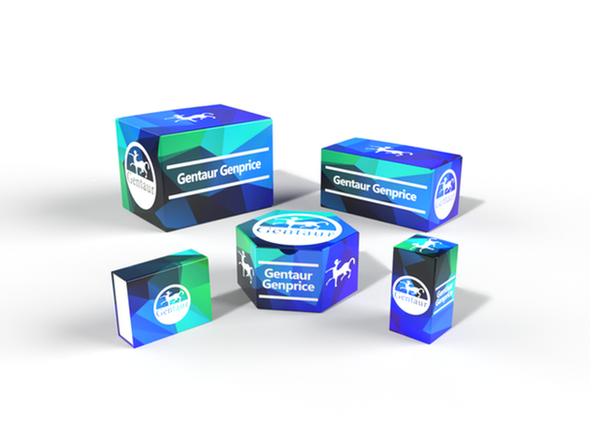Description
Exodus-2 Antibody (biotin) | XP-5128Bt | Gentaur UK, US & Europe Distribution
Host: Rabbit
Reactivity: Human
Homology: N/A
Immunogen: Produced from sera of rabbits pre-immunized with highly pure (>98%) recombinant hExodus-2 (human Exodus-2) .
Research Area: Chemokines & Cytokines, Signal Transduction, Antibody Pairs
Tested Application: E, WB
Application: ELISA:
Sandwich: To detect hExodus-2 by sandwich ELISA (using 100 μL/well antibody solution) a concentration of 0.25 - 1.0 μg/mL of this antibody is required. This biotinylated polyclonal antibody, in conjunction with our Polyclonal Anti-Human Exodus-2 (XP-5128) as a capture antibody, allows the detection of at least 0.2 - 0.4 ng/well of recombinant hExodus-2.
Western Blot:
To detect hExodus-2 by Western Blot analysis this antibody can be used at a concentration of 0.1 - 0.2 μg/mL. Used in conjunction with compatible secondary reagents the detection limit for recombinant hExodus 2 is 1.5 - 3.0 ng/lane, under either reducing or non-reducing conditions.
Specificiy: N/A
Positive Control 1: N/A
Positive Control 2: N/A
Positive Control 3: N/A
Positive Control 4: N/A
Positive Control 5: N/A
Positive Control 6: N/A
Molecular Weight: N/A
Validation: N/A
Isoform: N/A
Purification: Anti-hExodus-2 specific antibody was purified by affinity chromatography and then biotinylated.
Clonality: Polyclonal
Clone: N/A
Isotype: N/A
Conjugate: Biotin
Physical State: Lyophilized
Buffer: N/A
Concentration: N/A
Storage Condition: Exodus-2 antibody is stable for at least 2 years from date of receipt at -20˚C. The reconstituted antibody is stable for at least two weeks at 2-8˚C. Frozen aliquots are stable for at least 6 months when stored at -20˚C. Avoid repeated freeze-thaw cycles.
Alternate Name: ECL, SLC, CKb9, TCA4, 6Ckine, SCYA21, UNQ784/PRO1600, C-C motif chemokine 21
User Note: Centrifuge vial prior to opening.
BACKGROUND: Exodus 2 is one of several CC cytokine genes clustered on the p arm of chromosome 9. Cytokines are a family of secreted proteins involved in immunoregulatory and inflammatory processes. The CC cytokines are proteins characterised by two adjacent cysteines. Similar to other chemokines the protein encoded by this gene inhibits hemopoiesis and stimulates chemotaxis. This protein is chemotactic in vitro for thymocytes and activated T cells, but not for B cells, macrophages, or neutrophils.






